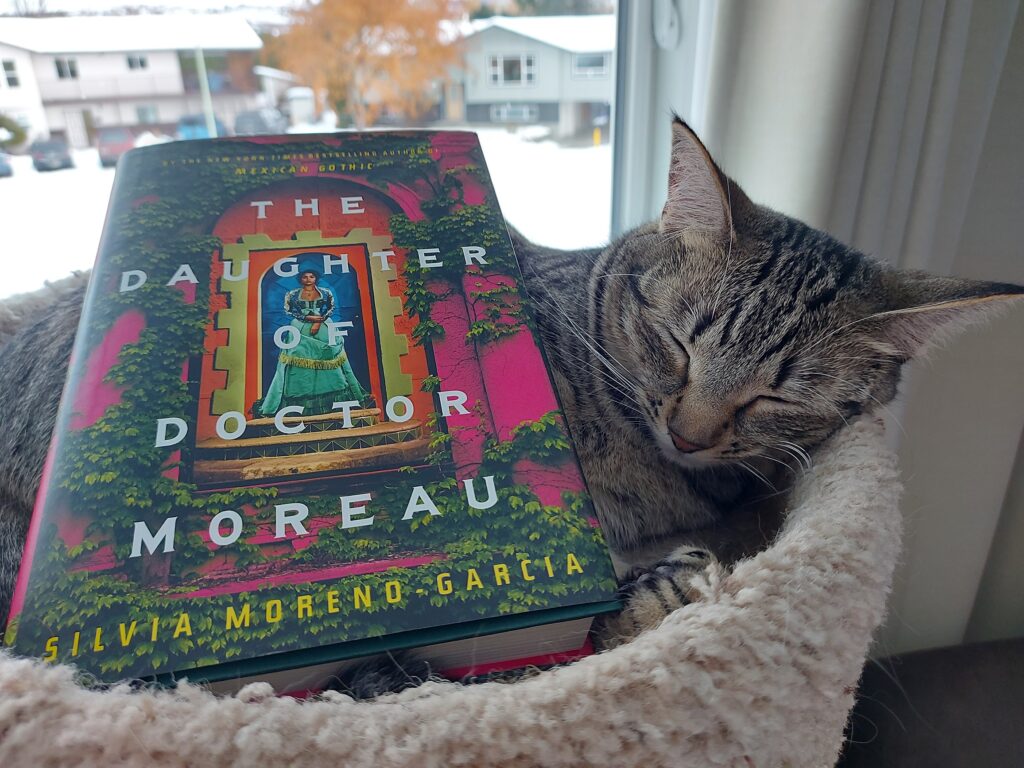The Daughter of Doctor Moreau by Silvia Moreno-Garcia

The Daughter of Doctor Moreau is my last completed book of 2022, and the third novel by Silvia Moreno-Garcia that I have read this year, after Mexican Gothic and Velvet Was the Night. Out of the three, I like this novel the best. If you are familiar with the works of H. G. Wells, then you will immediately realize that The Daughter of Doctor Moreau is inspired by The Island of Doctor Moreau. I have read The Island of Doctor Moreau, so long ago, though, that I cannot remember if I read it in high school or college, and I only have a vague recollection of not liking it and feeling sorry for Doctor Moreau’s hybrid creatures. On the other hand, I enjoyed reading The Daughter of Doctor Moreau, although I still feel sorry for the hybrids.
As she did with the gothic genre in Mexican Gothic and the noir genre in Velvet Was the Night, Moreno-Garcia has taken the science fiction genre and infused it with her Mexican heritage. The Daughter of Doctor Moreau is set in the 1870s in the Yucatan region of Mexico. The events in the novel unfold against the backdrop of colonialism and racism against the Mayans, who were used as cheap labour by the European descended landowners in Mexico, until the Mayans began to revolt against them. In the novel, Doctor Moreau has received funding from a patron to create the hybrids in the hopes that they can be used as labourers in the place of the Mayans.
The Daughter of Doctor Moreau is told from the alternating perspectives of Carlota, the titular daughter, and Montgomery Laughton, an Englishman hired to work as the majordomo at the ranch located deep in the Yucatan jungle where Doctor Moreau conducts his experiments. Carlota is 14 years old when the reader is first introduced to her and most of the novel’s action takes place when she is 20, but Carlota is still naïve and childlike in her behaviour because of her limited social interactions and because of her father’s controlling behaviour. Doctor Moreau has made himself into a god-like figure that Carlota and the hybrids both fear and respect. Laughton is about 15 years older than Carlota. He is an alcoholic who has come to work at the ranch because he’s trying to escape painful memories from his past. He does not like Doctor Moreau, but he is in love with Carlota and he is friends with the hybrids that he helps care for.
The ranch is lushly described as a beautiful paradise that Carlota could never imagine leaving, but of course this paradise is disturbed by the arrival of the son and the nephew of Doctor Moreau’s patron. The son, Eduardo, is immediately smitten by Carlota and sets out to seduce her, much to Laughton’s chagrin. Doctor Moreau, however, is only too eager to pimp out his daughter to Eduardo in the hopes that Eduardo will propose marriage to her, and then the funding for Doctor Moreau’s research and experimentation will be secure. Carlota is attracted to Eduardo, but she is also keen to make sure that the hybrids are safe and cared for.
Eduardo, and his cousin Isidro especially (a pompous religious prig), do not see the hybrids as Carlota and Laughton see them. To Eduardo and Isidro, the hybrids are just animals, property that Eduardo’s father paid for to do with as they please. Carlota grows up very quickly during the course of the novel as she learns to put her obedient nature aside in order to help her hybrid friends. It is obvious by the hints throughout the novel what is really going on with Carlota, but it is still great to read about a woman learning to come into her own power. I am happy to be able to finish off the year with a good book.